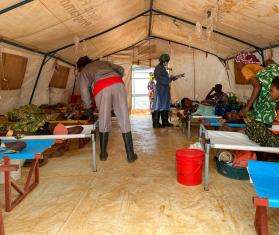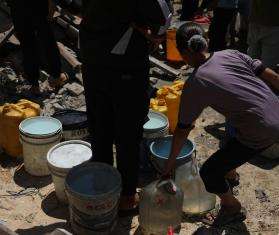After 22 months of Israel destroying and restricting access to critical water infrastructure, the amount of water available in Gaza is wholly insufficient.
Israel is deliberately depriving people of water in Gaza as part of its genocidal campaign that is denying Palestinians the necessities of life. Israel’s refusal to allow in fuel and equipment to repair damaged water pipes and desalination plants is making it impossible for people to get enough water, leading to deadly medical consequences.
Organizations like Doctors Without Borders/Médecins Sans Frontières (MSF) would be able to increase the amount of safe water in the Strip, but Israel is blocking imports of critical water treatment items like spare equipment parts and chlorine. Since June 2024, for every 10 import requests of items for water desalination, MSF has had only one approved.
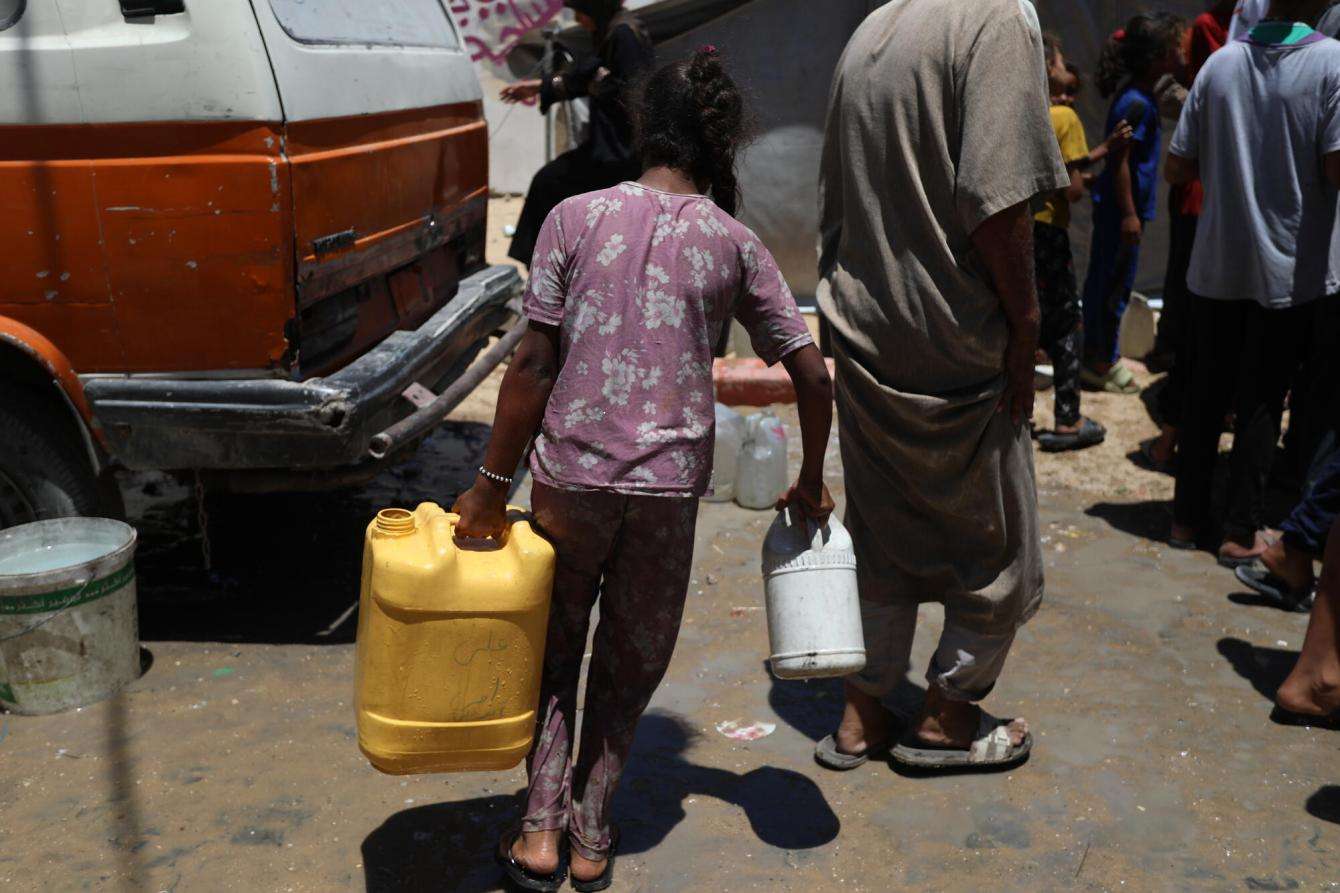
Israel is weaponizing and throttling people’s access to water
Israel must begin allowing the importation of critical equipment for water supply and distribution at scale. The Israeli military must stop its destruction of water infrastructure and allow the immediate repair of water systems that have been damaged to ensure people have life-sustaining access to water. Water and other necessities of life must not be used as weapons of war.
Not only is there insufficient water overall for people in Gaza, but the reliance on water trucking means people don’t always know when or where their next glass of drinking water will come from. Eighty-six percent of Gaza is under forced displacement order by the Israeli military, making it unsafe for water trucks to attempt to reach people in those areas. It’s also difficult for people who’ve been displaced time and time again and are living in makeshift shelters to store any water they do get, compounding the problems people face.
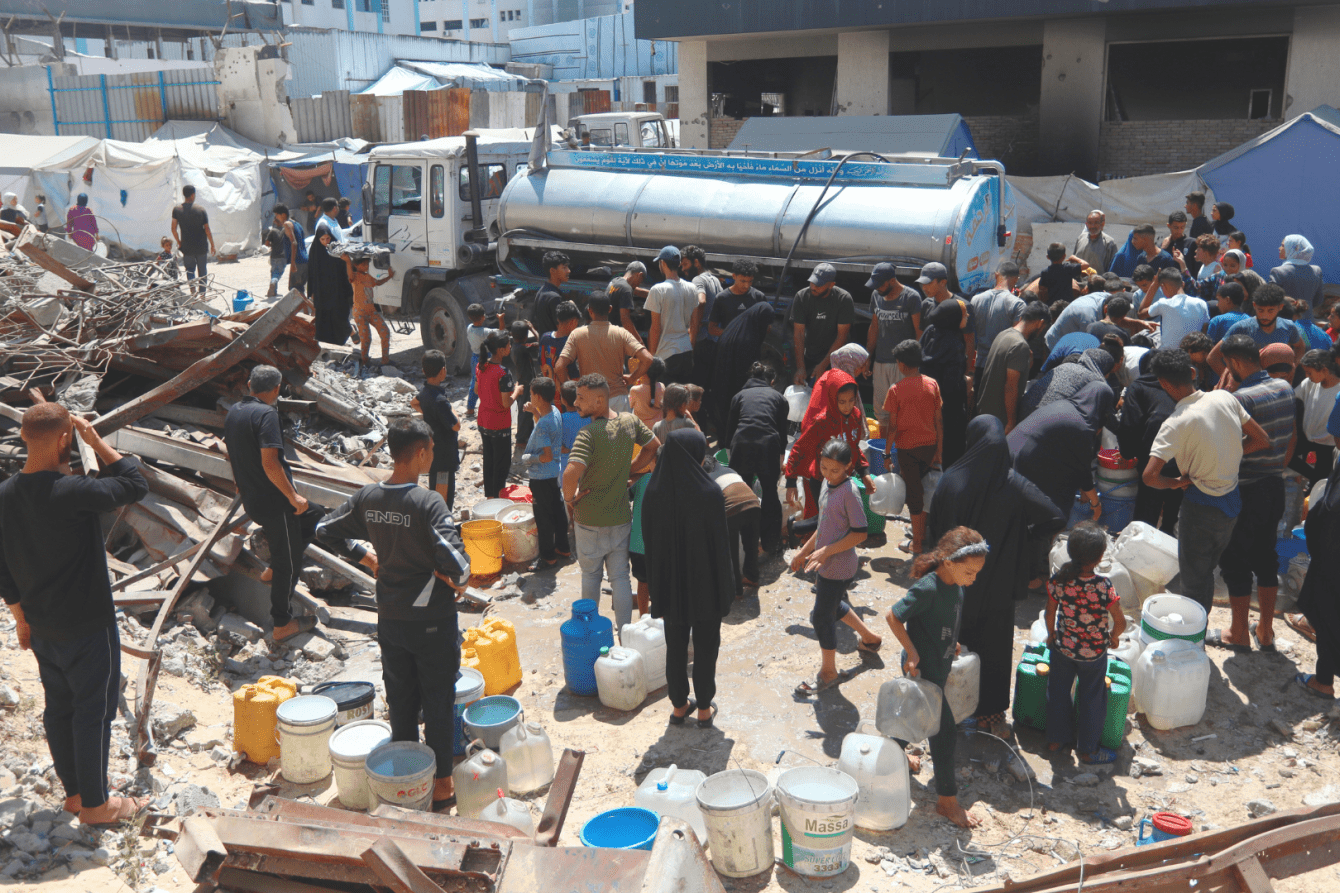
The lack of clean water fuels the rapid spread of diseases
The reduction of clean water in Gaza has resulted in an increase of disease, with MSF medical teams conducting over 1,000 consultations for acute watery diarrhea per week for the past month. Without sufficient water for hygiene, people have been suffering from skin conditions such as scabies.
Clean water is also essential for hospitals to reduce the spread of infection and to keep patients hydrated so their bodies can heal from their injuries and illnesses.
“There’s too little water for too many people,” says Mohammed Nsier, a water and sanitation officer for MSF in Gaza. “The amount we can provide is very small compared to the need, and conditions are extremely difficult.”
Draining Gaza dry: How Israel stops NGOs like MSF from providing water
Humanitarian organizations are struggling to increase water production activities. Since June 2024:
- Israel has often refused the entry of new desalination units, and not permitted the entry of key elements to produce and distribute water, such as generators, spare parts of equipment, and chlorine and other chemicals used to treat water.
- Of all MSF submissions to approve entry of items essential to water treatment, only 51 percent have been approved. For items necessary for water desalination, 11 percent have been approved (instead of refused or remaining pending). The same item may be approved one time and rejected the next, like membranes and filter parts used in desalination.
- Many water and sanitation items also remain pending for authorization for months. Some requests for water pumps, spare parts, and water tanks have been pending for hundreds of days.
- Fuel, essential to power the generators running the water plants and the water distribution trucks, is not entering in sufficient quantity. Currently, the Israeli authorities are allowing in the bare minimum of fuel each week. There is only enough for essential services to run at minimal capacity for a short time, not knowing week by week whether they will be able to continue.
Israel created the conditions that make water delivery nearly impossible
Israel has always controlled much of the flow of water into Gaza. There is no naturally available drinking water in Gaza because of salination and contamination of sewage and chemicals, making people reliant on pipelines coming from Israel and desalination plants in Gaza. This infrastructure has been subjected to continuous Israeli attacks.
Israel has repeatedly damaged two out of the three water pipelines into Gaza since October 2023. It is estimated that 70 percent of the water that goes through these pipes is lost because of leaks in the broader pipeline network from the damage caused by bombardment.
As a result, water must be distributed by water trucking, coming from desalination plants. Of the 196 desalination plants that are publicly and NGO-run, over 60 percent are non-functional because of their location or damage.
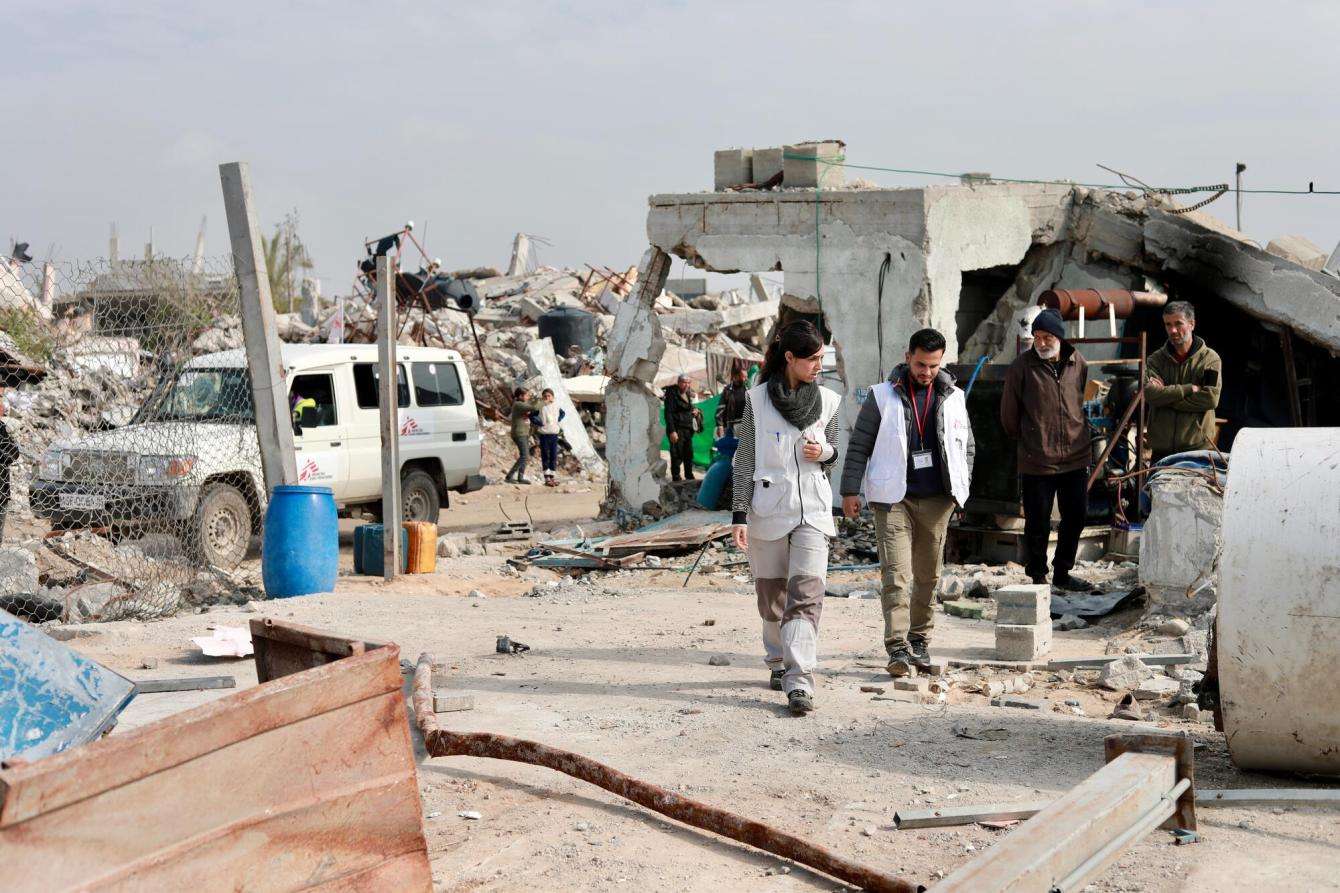
NGOs can and want to fix the damage, but Israel is not letting them
Humanitarian organizations are willing to repair the damaged pipes and plants of the water infrastructure that existed before October 2023, but Israel has repeatedly hindered these efforts by denying access to these sites.
For locations that are reachable, repair efforts are limited to “Frankenstein” techniques—locally sourcing necessary parts, or salvaging parts from one generator or broken sites to fix another. Such actions are necessary as the supplies required to repair this infrastructure are impeded from entering Gaza by Israel. When items do come in, they arrive months late because of deliberate blockages.
Seven MSF water treatment units can only produce a small amount of the water that people desperately need. For months, MSF has been trying to deliver nine new treatment units to Gaza—which would significantly increase MSF’s water production capacity—but these efforts have remained unsuccessful as Israel has not issued approvals or allowed the units to enter Gaza.
Israel is impeding the delivery of the little water there is
Even when water trucks can reach desalination plants, distributing it to people safely is almost impossible. The expansion of military activities and bombardments in so-called safe zones has forced distribution points to be continually re-located. In 2025, MSF has had to stop providing water at least 137 water distribution points. To reach distributions, people must walk long distances carrying their heavy jerry cans.
“You see how people are struggling, everyone is desperate for water,” says a woman waiting for an MSF distribution in Gaza city. “Honestly, [it’s] very, very hard to get water, even walking a little bit is very difficult. I don’t know what to tell you—it’s torture.”
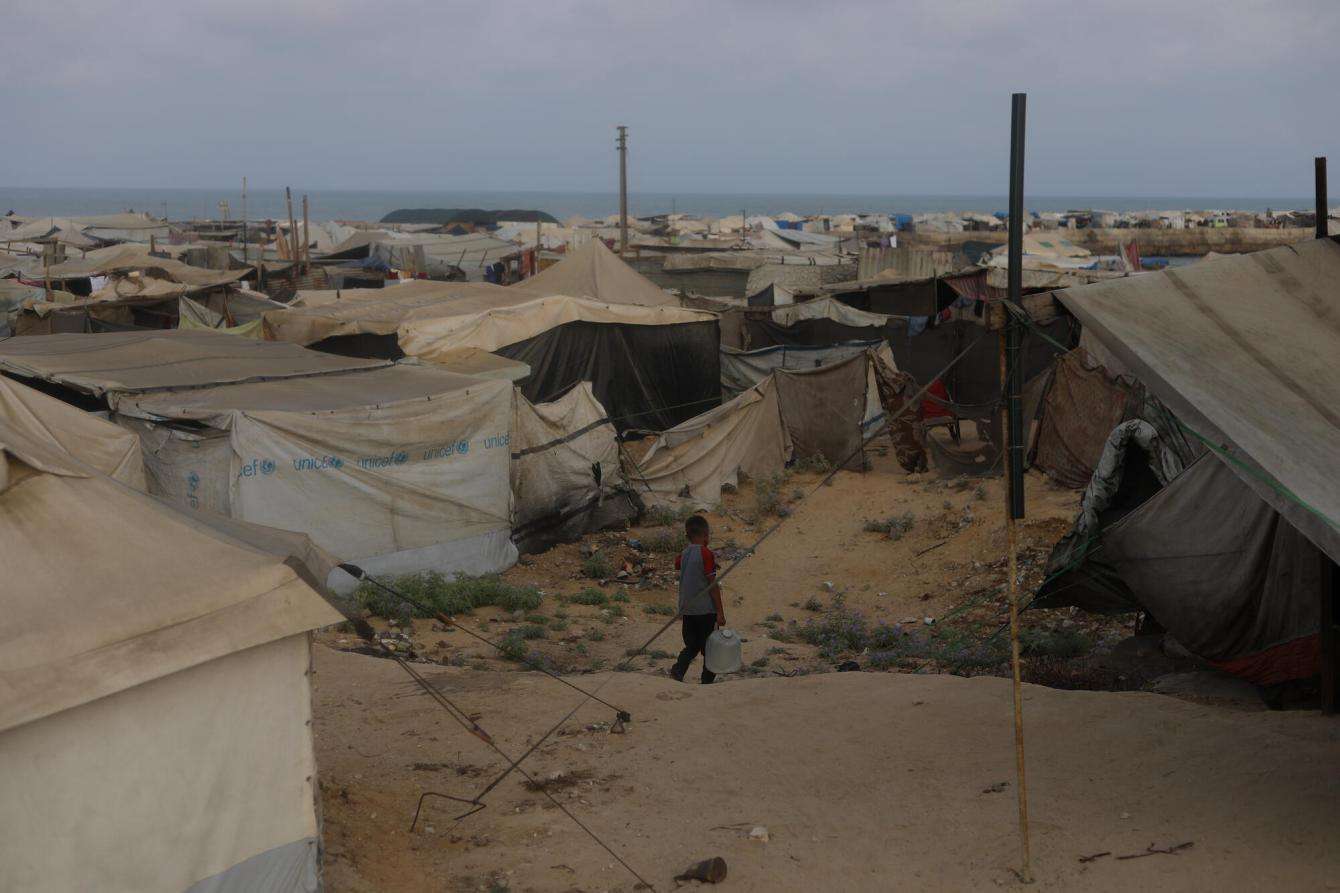
Traveling to distribution sites is dangerous and scary for Palestinians
It is dangerous for Palestinians to go and collect water; there is not enough to go around and that creates tension at distribution sites. People have told MSF staff that—even though they’re desperate—they’re afraid to collect water. Our teams see children who’ve gotten lost after going to a distribution site that had been forced to move by a displacement order or an airstrike, or because extensive damage has made their surroundings unrecognizable.
“As with food, supplies, and health care, the Israeli military is restricting access to water to minimal levels,” says Ozan Agbas, MSF emergency manager. “By refraining from cutting off water entirely, they allow plausible deniability while choking Palestinians of their means of survival.”
1837.png)
